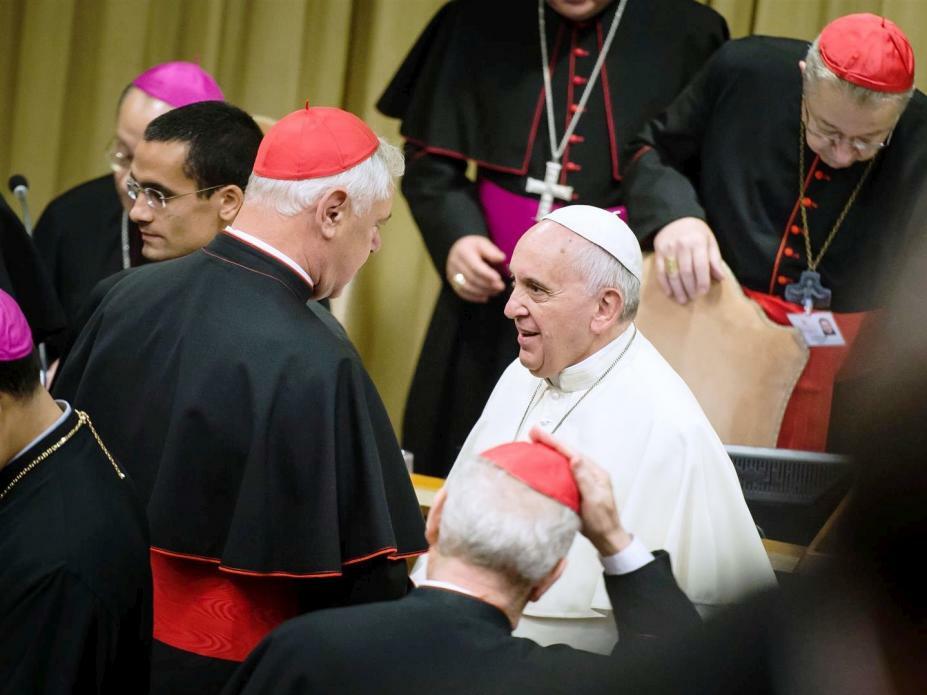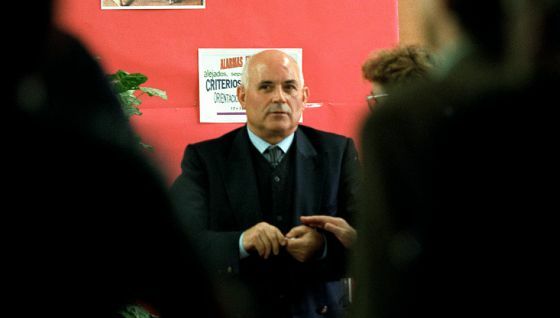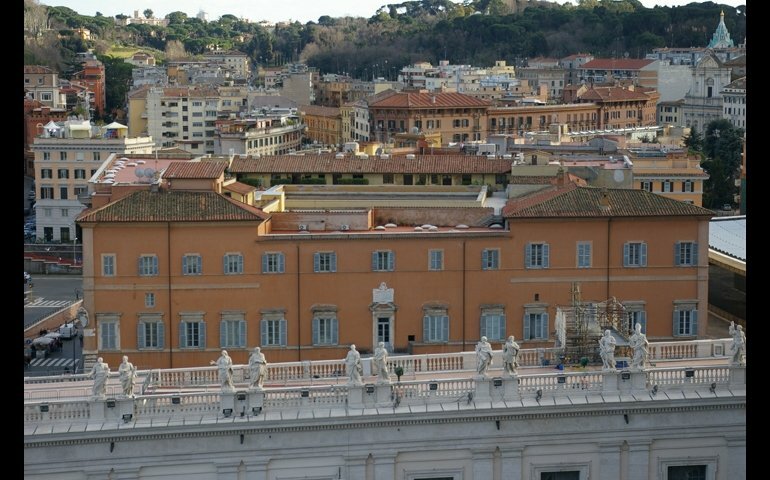Teólogos, religiosos y obispos "examinados" por Roma reclaman al Papa cambios profundos "Los procesos en Doctrina de la Fe son contrarios a la justicia natural y tienen que reformarse"
(Cameron Doody, especial para Religión Digital).- Un grupo de teólogos, religiosos y obispos católicos -todos ellos "examinados", en un momento u otro, por la Congregación para la Doctrina de la Fe-, han escrito al Papa Francisco y al prefecto de la CDF, el cardenal Gerhard Müller, reclamando reformas en los procesos eclesiásticos actuales relativos a investigaciones doctrinales.
La carta del grupo -titulada (del inglés) "Un nuevo proceso para la Iglesia y la Congregación para la Doctrina de la Fe" ("Un nuevo proceso") y publicada esta mañana en la página de la Association of Catholic Priests de Irlanda- fue mandada a finales de febrero de este año pero, de momento, no ha recibido contestación.
Los 15 firmantes de la misiva -entre los cuales figuran teólogos prominentes estadounidenses e irlandeses (más un español, el padre Marciano Vidal), monjas altamente comprometidas con la defensa de los derechos humanos (una de ellas sor Teresa Forcades), y dos obispos australianos ya jubilados- denuncian que los procesos actuales de la CDF "son contrarios a la justicia natural y tienen que reformarse."
Mientras que las investigaciones doctrinales, tal y como se llevan a cabo actualmente, están marcadas por "las presunciones absolutistas de un sistema legal anticuado," los signatarios reclaman la implantación de principios y actitudes que están más acordes con los valores evangélicos de justicia, verdad, integridad y misericordia, por un lado, y más conformes a los criterios modernos de respeto para los derechos humanos, "la libertad de expresión, el pluralismo, la transparencia, y la plena asunción de responsabilidades," por otro.
Con el fin de hacer que el proceso para investigaciones doctrinales sea más justo e imparcial -y para asegurar que la CDF y las conferencias episcopales siempre se vean obligadas a asumir sus deberes y responsabilidades hacia el teólogo "delatado"- los firmantes de "Un nuevo proceso" proponen una serie de ocho medidas sobre las cuales sostener la reforma que estiman necesaria de los procesos de la CDF.

En primer lugar, sostienen, el acusado debería disfrutar "de la presunción de sinceridad, inocencia y lealtad hacia la Iglesia." Es más, el acusado debería saber quién le acusa, y quién le juzga -un cambio a la habitual práctica que permite denunciaciones anónimas y que envuelve los nombres de los teólogos-consultores en un velo de misterio.
Esta transparencia con respecto a los nombres de acusadores y examinadores, en la opinión de los firmantes, tiene que transformarse también en un trato más compasivo y personalizado hacia el acusado por la duración del proceso. Al teólogo denunciado no se le debería dejar solo y obligado a entenderse con la CDF a tercera o cuarta mano, solo a través de obispos o superiores -quienes pueden ser, después de todo, sus partidarios o detractores- y se le debería ofrecer, también, una oportunidad para hablar en su defensa, con el fin de minimizar la posibilidad de que sus opiniones se tomen fuera de contexto o que sean malentendidas de cualquier otra forma.
Además de este mayor grado de imparcialidad, transparencia y responsabilidad, los signatarios de "Un nuevo proceso" plantean estrictos límites de tiempo para los procesos de la CDF para reducir el riesgo a la salud de los afectados y, por último, que las investigaciones doctrinales actualmente en curso sean remitidas al sínodo episcopal para que las opiniones sospechosas, y su evaluación, se sitúen "en el contexto cultural más amplio en el que originariamente fueron articuladas."
Los firmantes de "Un nuevo proceso" concluyen su misiva con un llamamiento final a que se acabe el monopolio de la CDF y sus asesores sobre el discernimiento de asuntos de la fe y la creencia -un proyecto que, en realidad y según sostienen los autores, involucra a "toda la comunidad de teólogos, los fieles de Dios y el sensus fidelium."
¿Recibirán pronto los signatarios de "Un nuevo proceso" alguna respuesta a su carta? La ACP, en el comunicado que hizo público esta mañana junto con el texto de la misiva, afirma que el único contacto que ha recibido del Vaticano a día de hoy ha sido un paquete con una copia del volumen "To Promote and Defend the Faith" ("Promover y defender la fe") -un libro de los procesos y normas de la CDF- mandada por el arzobispo Luis Ladaria Ferrer, secretario de la CDF, al padre Tony Flannery, cura redentorista y firmante de la carta (o, más bien, al superior de éste).
No obstante, la ACP aún guarda la esperanza de que la CDF esté a la altura del pensamiento del Papa Francisco, tal y como se ha manifestado más recientemente en la Exhortación Amoris laetitia: "Naturalmente, en la Iglesia es necesaria una unidad de doctrina y de praxis, pero ello no impide que subsistan diferentes maneras de interpretar algunos aspectos de la doctrina o algunas consecuencias que se derivan de ella" (AL 3).

Estos son los firmantes:
Dr Paul Collins, writer and broadcaster, Australia
Rev Charles Curran, Scurlock University Professor of Human Values at Southern Methodist University, Dallas, USA
Rev Roy Bourgeois, priest and activist, USA
Rev Brian D'Arcy CP, writer and broadcaster, Ireland
Rev Tony Flannery CSsR, writer and broadcaster, Ireland
Sister Teresa Forcades, OSB, Benedictine nun and physician, Spain
Sister Jeannine Gramick, SL, Loretto Sister, Co-Founder, New Ways Ministry, USA
Sister Elizabeth A. Johnson, CSJ, Distinguished Professor of Theology, Fordham University, New York, USA
Professor Paul Knitter, Emeritus Paul Tillich Professor of Theology, World Religions and Culture, Union Theological Seminary, New York, USA
Rev Gerard Moloney, CSsR, Editor, Ireland
Bishop William Morris, Bishop Emeritus of Toowoomba, Australia
Rev Ignatius O'Donovan, OSA, Church Historian, Ireland
Rev Owen O'Sullivan, OFM Cap, Chaplain and Writer, Ireland
Bishop Patrick Power, retired Auxiliary Bishop of Canberra- Goulburn, Australia
Rev Marciano Vidal, CSsR, Former Ordinary Professor, Pontifical University Comillas, Madrid, Spain, Extraordinary Professor, Alphonsian Academy, Rome
Versión en inglés
Judge, jury, executioner... and Christian?
Group of theologians, religious, and bishops seek changes in processes of the Congregation for the Doctrine of the Faith
"The process should be no longer characterised by the absolutist presumptions of an antiquated legal system that has nothing to do with the Gospel"
By Cameron Doody
An international group of Catholics-all of whom have, at one time or another, been subjected to formal examination by the Congregation for the Doctrine of the Faith (CDF)-have written to Pope Francis and the Prefect of the CDF, Cardinal Gerhard Müller, appealing for an overhaul in current church procedures surrounding doctrinal investigations.
The letter-entitled "A New Process for the Church and the Congregation for the Doctrine of the Faith" ("A New Process") and published this morning on the website of the Irish Association of Catholic Priests (ACP)-was sent in late February this year but has, to date, gone unanswered. The fifteen signatories to the letter, whose number include prominent theologians, a church historian, media personalities, religious involved in cutting-edge forms of social advocacy, and two former bishops, charge that the current processes of the CDF "are contrary to natural justice and in need of reform." Whereas doctrinal investigations, as they are currently carried out, are marked by "the absolutist presumptions of an antiquated legal system," these writers call for the implementation of principles and attitudes that are more in line with the gospel values of justice, truth, integrity, and mercy, on the one hand, and modern standards of human rights, "free speech, pluralism, transparency, and accountability," on the other.
With the aim of making the process of doctrinal investigations more just and more equitable, and to encourage accountability on the part of the CDF and Bishops' Conferences, the writers of the letter propose a series of eight principles that must underline any future reform of CDF processes. To begin with, write the signatories to the letter, the accused must enjoy "the presumption of sincerity, innocence, and loyalty to the church." He or she too should be able to know by whom he or she is being accused and judged-a departure from the current CDF practice that allows anonymous denunciations and throws a cloak of secrecy over the names of the Vatican-appointed doctrinal consulters. This greater openness with respect to the names of accusers and examiners, the letter writers state, must also carry over into a more compassionate and personalised treatment of the accused during the process. The accused must not be left in isolation and made to deal with the CDF at third or fourth hand through bishops or superiors-who may, after all, be either their supporters or accusers-and the accused must be able to have their own say during the procedure, so as to minimise the risk of their opinions being deliberately taken out of context or deliberately misunderstood.
In addition to increased fairness, transparency, and accountability, the writers of the letter also propose strict time limits for CDF processes in order to minimize the personal toll taken on those investigated and, lastly, that ongoing doctrinal investigations be referred to the Synod of Bishops so as to resituate the suspect opinions, and their examination, "within the broader cultural context in which they were first articulated."
The signatories to "A New Process" conclude their letter with a call to end the monopoly of the CDF and its advisers over the discernment of matters of faith and belief, which rather involves, in the authors' opinion, "[t]he wider community of theologians, the faithful people of God and the sensus fidelium."
Will the letter continue to go without an answer? The ACP, in a statement this morning accompanying their posting of "A New Process," states that the only contact the signatories have received from the Vatican to date has been a copy of "To Promote and Safeguard the Faith"-a CDF book of norms and procedures-sent by Archbishop Luis Ladaria Ferrer, Secretary of the CDF, to Father Tony Flannery, a Redemptorist father and signer of "A New Process": or, rather, to Flannery's superior. Still, the ACP has expressed its hope that the CDF can live up to the thinking of Pope Francis as this have been set out most recently in Amoris laetitia: "Unity of teaching and practice is certainly necessary in the Church, but this does not preclude various ways of interpreting some aspects of that teaching, or drawing certain consequences from it."
